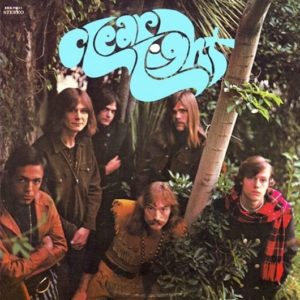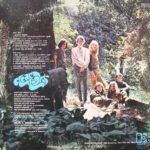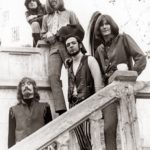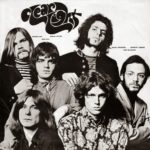I’ve said it before and I will say it again I will give anything on the Elektra label from the 60s and early 70s a go.
Clear light seem to have some musical credibility (or collectability) despite their small output
Sometimes you just have to be around, at the right time, in the right place, with the right sound. It may not pay off immediately but fifty years down the track there is some bloke in Australia writing about you.
The entire wikipedia entry is as follows. Do I really need to reword it when I can just quote it?
Well, I preface this by saying the group were made up of (with the exception of De Young, a Los Angeles native) young guys, musicians, who all converged and met in Los Angeles during the big (cultural) head west of the 1960s.
In 1966, The Brain Train formed and was managed by Sunset Strip hipster Bud Mathis. They recorded one single – "Black Roses", written by Wolfe Dios – before changing their name to Clear Light and signing to Elektra Records. Guitarist Bob Seal felt the name should be changed to coincide with the single. Clear Light shared its name with a potent form of LSD, although Seal states the name came from his studies of Eastern philosophy. The Doors' producer Paul A. Rothchild took over management of the band.
The core members of Clear Light were Bob Seal, lead guitarist and vocals, Robbie "The Werewolf" Robison, rhythm guitar and vocals, Doug Lubahn bass and vocals, Dallas Taylor drums, and Michael Ney on an atypical second set of drums. The original line-up was featured in the 1967 motion picture The President's Analyst, with Barry McGuire cast as their leader and vocalist. They soon added Cliff De Young on lead vocals and this is the version of the band seen on their only album cover. However, sometime during the recording process, often described as "brutal", Paul Rothchild was not happy with Robison's guitar playing skills and pressured the group to remove him – he was replaced by keyboard player Ralph Schuckett.
In what has been called the band's finest hour, drunken customers in a Park Avenue club heckled them so brutally that Ralph Schuckett, the usually gentle organist, hurled a few choice words back at them. The band walked off the stage, retired to the Albert Hotel, and woke up in the morning to find that they had become underground heroes …
Paul Rothchild then pressured the other members of the band to fire Bob Seal". Seal was replaced by ex-Fug Danny "Kootch" Kortchmar; Cliff De Young was soon to follow, and after having started work on a second album the group disbanded in 1968.
https://en.wikipedia.org/wiki/Clear_Light
Yes, I will say it again, sometimes you just have to be around, at the right time, in the right place, with the right sound. It may not pay off immediately but fifty years down the track there is some bloke in Australia writing about you.
The time: 1960s
The place: Los Angeles, California
The sound: Garage psychedelica
But garage psycedelica laced with vaudeville, folk and soul-tinged rock.
The pastoral setting on the front and back sleeves is wholly inaccurate … unless a bulldozer is ploughing down your forest. (given the letterbox this was their California communal residence, perhaps)
The band were famously known for including two drummers (one of them being Dallas Taylor of CSNY and Manassas fame) and are of their time.
This is organ driven heavy psychedlica may be a smidgen ahead of the curve.
The lyrics tend to the gloomy and there is a bit of doom and foreboding but this is classic psych rock, with strong fuzz guitar, distorted hammond sound, raga inspired guitar solos and LSD channelled lyrics.
They come over as a cross between (label mates) The Doors, (label mates) Love, (home town Los Angeles band) The Seeds with a touch of Black Sabbath but there was something going on here.
No one creates in a vacuum and with label mates like The Doors and Love, Los Angeles, late 1960s something good was going to come from all this.
What makes you great is the quality of the material and (refreshingly for psych) short songs.
Clear Light have it though miss out by not having that one truly memorable track which will draw people (fifty years down the track) in. A pity because this is well worth listening to.
Produced by Elektra regular (and Doors producer) Paul A. Rothchild.
Tracks (best in italics)
Side One
- Black Roses – (Clear Light, Wolfgang Dios) – this has most of the psychedelic motifs: urgent vocals, trippy guitars, change of pace interludes and it is very catchy.
- Sand – (Douglas Lubahn) – this is in the style i associate with English pschedelica. A thumping back beat , dark obscure lyrics, jazzy organ, a strident vocal, and an overall sense of doom. Bob Seal does lead vocal here.
- A Child's Smile – (Clear Light, Michael Ney) – a gentle psych lullaby.
- Street Singer – (Greg Copeland, Steve Noonan) – released by singer songwriter Greg Noonan on his self-titled album for Elektra (1968). "Street Singer" here it sounds like proto slow grind metal ( a little like early Black Sabbath). Certainly it is a heavy psych track. The doom is heavy (and obvious): "The old organ grinder has just gone insane and his monkey lies dead, choked to death on its chain")
- The Ballad of Freddie and Larry – (Cliff De Young, Ralph Schuckett) – another heavy one.
- With All in Mind – (Bob Seal) – a bit more optimistic in tone and quite catchy though still heavy handed, musically and lyrically. Bob Seal does lead vocal here.
Side Two
- Mr. Blue – (Tom Paxton) – Originally (?) released by folk singer songwriter Tom Paxton on his fourth album “Morning Again” from 1968. A theatrical piece which isn't great but is certainly memorable.
- Think Again – (Clear Light, Douglas Lubahn) – light sunshine psych (though still quite dark by those standards)
- They Who Have Nothing – (Bob Seal) – more gentle psych with guitar breaks, harmonised vocals and many asides. A little like contemporaries the Nazz.
- How Many Days Have Passed – (Bob Seal) – folkie psych. The questioning (and accusatory) lyrics are perfect for the time.
- Night Sounds Loud – (Douglas Lubahn) – another great example of a psych number with typically obscure lyrics and oxymoronic words … "night sounds loud".
And …
This never transcends its time. Still everyone should have at least one (per hundred) in their collection. It is fun and it grows on you … I'm keeping it.
Chart Action
US
Singles
—
Album
1967 #126
England
nothing
Sounds
Complete album
https://www.youtube.com/playlist?list=PL8a8cutYP7fqyw_t5WmWPRKZnxHixCF-5
Sand
https://www.youtube.com/watch?v=DKl-44NheDU
A Child's Smile
https://www.youtube.com/watch?v=zAIbGnypvxU
Street Singer
https://www.youtube.com/watch?v=HXRBLyLQtiM
With All in Mind
https://www.youtube.com/watch?v=y4h-hssNkOg
Mr. Blue
https://www.youtube.com/watch?v=h4hpd4lcwpo&list=PL8a8cutYP7fqyw_t5WmWPRKZnxHixCF-5&index=7
They Who Have Nothing
mp3 attached
Night Sounds Loud
https://www.youtube.com/watch?v=Av9gAwGbvP0
Others
https://www.youtube.com/watch?v=s6bDgScXiQ4
Clear Light, making a cameo appearance from the film "The President'a Analyst" (1967). The band play, "She's Ready To Be Free" the B-side to their classic, "Black Roses", 45. , Barry McGuire is on (guest) vocals instead of Cliff De Young (who may not have joined yet)
Review
https://en.wikipedia.org/wiki/Clear_Light_(album)
http://therisingstorm.net/clear-light-clear-light/
http://www.psychedelicbabymag.com/2016/07/clear-light-clear-light-1967-review.html
Bio
https://en.wikipedia.org/wiki/Clear_Light
http://therockasteria.blogspot.com.au/2014/04/clear-light-clear-light-1967-us-superb.html
https://www.rollingstone.com/music/news/david-frickes-reissue-picks-terry-reid-clear-light-20160615
a complete history
https://www.garagehangover.com/clearlight/
https://en.wikipedia.org/wiki/Cliff_DeYoung
https://en.wikipedia.org/wiki/Douglass_Lubahn
https://en.wikipedia.org/wiki/Dallas_Taylor_(drummer)
https://en.wikipedia.org/wiki/Ralph_Schuckett
Website
Trivia
- Personnel: Bass Guitar – Douglas Lubahn / Drums – Dallas Taylor / Drums, Percussion – Michael Ney / Guitar – Bob Seal / Lead Vocals – Cliff De Young / Organ, Piano, Celesta – Ralph Schuckett / Producer – Paul A. Rothchild
- Cliff de Young left the band to do acting. He was in the Broadway productions of “Hair” (1972) and (starred in) "Sticks and Bones". He starred in the made for television movies, "The Night That Panicked America"(1975), "The Lindbergh Kidnapping Case"(1976),"The 3,000 Mile Chase "(1977) and the unsuccessful TV series "Sunshine" (1975) as well as doing leads, “Shock Treatment” (1981) and supports in feature films including "Blue Collar"(1978), "The Hunger"(1983), “Reckless” (1984), “Protocol” (1984), "Flight of the Navigator"(1986), "F/X" (1986), "Glory"(1989), "The Craft" (1996) and "Road to Nowhere" (2010). He released a self-titled solo album on MCA in 1973.




